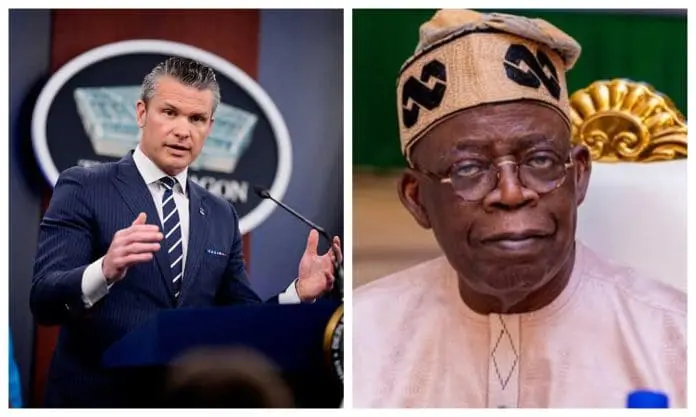U.S. War Secretary Confirms Preparing for Action in Nigeria

Tensions escalated on the international stage as the United States War Secretary, Pete Hegseth, declared that his department is “preparing for action” in Nigeria, following former President Donald Trump’s warning over alleged persecution of Christians in the country.
Hegseth made the statement via his official account on X (formerly Twitter), responding directly to Trump’s call for the U.S. government to take firm steps against what he described as “systematic killings of Christians” in Nigeria’s northern regions.
“Yes, sir. The killing of innocent Christians in Nigeria — and anywhere — must end immediately. The Department of War is preparing for action. Either the Nigerian Government protects Christians, or we will kill the Islamic terrorists who are committing these horrible atrocities,” Hegseth posted.
The post sparked global reactions, with analysts warning that such rhetoric, if followed by military mobilisation, could significantly alter U.S.-Africa relations and undermine Nigeria’s sovereignty.
Trump had earlier accused the Nigerian government of turning a blind eye to attacks on Christian communities, vowing to suspend U.S. aid and impose sanctions if “the massacre” continues.
He hinted that military intervention could be an option should diplomatic pressure fail.
In response, Nigerian authorities expressed shock over the remarks but emphasised the country’s commitment to combating terrorism in all its forms. Presidential spokesperson BayonOnanuga said the government welcomed “constructive partnership” with the U.S. in tackling insecurity, but cautioned against any action that could threaten Nigeria’s independence.
“Nigeria is an independent and sovereign nation,” Onanuga said. “We are open to international cooperation in the fight against terrorism, but such collaboration must respect our territorial integrity and internal processes.”
The statement has sparked wide debate within diplomatic circles.
Some Western analysts interpret Trump and Hegseth’s comments as political grandstanding, noting that direct U.S. military intervention in Nigeria remains unlikely without congressional approval. Others believe the remarks could still translate into increased pressure on Nigeria, possibly through sanctions or conditional aid.
Experts also link the development to growing religious tension narratives in global politics, with Nigeria’s internal conflicts — including those involving Boko Haram, ISWAP, and bandit groups — often mischaracterised as purely faith-based rather than complex socio-political crises.
As of press time, Washington has not issued an official policy statement confirming any deployment plans. However, the tone from Trump and the War Department has stirred unease across African diplomatic missions, with several nations calling for restraint and renewed dialogue.
Observers say the coming days will test Nigeria’s diplomatic agility as it seeks to defuse rising tensions while maintaining its partnership with the United States — a balance that could prove crucial for regional stability in West Africa.









